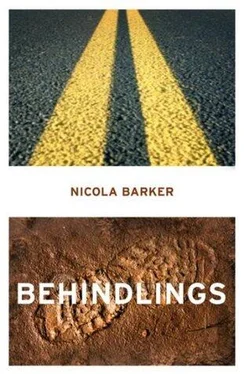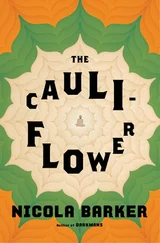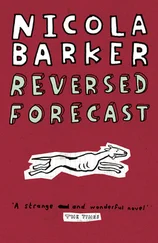Eileen began humming again. Her voice was low, but the song was lower, the bottom notes collapsing like a confident ballerina into the powerful arms of her partner.
Wesley stood and listened. He closed his eyes for a second. Oh, he told himself, this is one of those moments… He tingled. He shuddered. Then he opened his eyes, removed his jacket, took something else — was it the knife? The hunting knife? — from his trouser pocket, hid it behind him with one hand, while holding the coat up — high and close in front of him — with the other.
Rabbit-duck?
Duck-rabbit!
Ludwig? Ludwag!
Catch me out, honey,
And I’ll catch you at it
He hadn’t made it easy for her. But why the hell should he? He was just a boy. She was just a girl. It was biologically determined that things would be complicated.
She’d bought him a cold drink (wouldn’t he prefer something warmer? A cocoa or a Horlicks? Did they even do Horlicks here? No.
No, he wanted a cold drink. He didn’t like his drinks warmed. He liked them bubbly. He liked them icy. He liked them cheap and sharp and sweet).
Jo ordered herself a milky tea — she was absolutely ruddy freezing — cupped her hands around it, held her chin over the steam, felt her nose running, and sniffed, under her breath, repeatedly.
At least he’d let her buy him something to eat (a sacrifice of some considerable magnitude on his part, apparently). His needs were very particular — she noted — as he guardedly selected a serving of coleslaw in its own polystyrene tub, a packet of fries — French, puckered, browning — and a seeded burger bun, with gherkins and extra onions (cubed, minutely, in the characteristic Wimpy way), but without the meat (without the patty. Now that was… that was funny), followed, climactically, by a large and sticky Brown Derby (ice cream in winter? Was the boy deranged?) with all the nutty and saucy trimmings.
Patty — it soon transpired — had absolutely no table manners to speak of (or not to speak of, as the case may be, except with his mouth full, his eyes rolling and his two sharp elbows tent-pegging the table). Yet this lack wasn’t just a casual deficit; he seemed cheerfully and positively opposed to all forms of etiquette. He reminded Jo of a feral canine. A scavenger. One of those lean mutts who patrolled the dusty suburban streets in Tenerife or Tunisia. In packs. One of those mean beasts. Tick-infested — too thin — hungry — snarly — hungry.
Then to top it all off — and adding insult to injury — instead of calmly unburdening while he was grabbing and prodding, fingering and scoffing (he did promise to unburden, didn’t he?), the boy proceeded to try his level best to interrogate Jo instead. He needed to get his head around her. He needed to fit her, somewhere — to parcel her up, to slot her in, to neaten her. It was, she presumed, a ten-year-old boy thing.
‘You grew up in this shithole, then?’
His first question. He had a droplet of salad cream in the gap between his mouth and his nose. Jo stared at it, resignedly.
‘What’s your problem with Canvey?’ she countered. She was a local girl. She had local pride.
‘Wesley has written,’ the boy told her, straightening his backbone as he quoted the master, ‘that the Estuary Islands — and Canvey in particular — remind him, geographically, of the American Delta.’
Jo was unimpressed, ‘Lots of people say that. I think it’s basically just…’ she considered her choice of words carefully, ‘just crap, really.’
‘Why?’
The boy opened his bun and arranged some french fries on it. He laid them straight — in a carbo-raft — then painstakingly tipped the coleslaw over.
‘Has Wesley ever been to America?’
The boy shrugged, ‘Dunno. But his dad did. His dad was a marine in the British Navy.’
‘Really?’
I believe so,’ the boy nodded his small head, gravely.
Jo smiled. Against her better judgement, she found herself warming to this prickly creature. This tyke. This urchin.
‘I didn’t know that,’ she told him, ‘but it certainly explains a lot.’
The boy stared at Josephine across the table, his Cola suspended halfway between its soggy red paper coaster and his lips. He was deeply unimpressed by her cheery veneer. He detected more than a whiff of grown-up condescension in it. He was a wise child. And sensitive.
‘You don’t know squat, then,’ he barked out, ‘do ya?’
He took a swig of his drink, wincing, grotesquely, as it hit his fillings. Jo rapidly revised her good opinion.
‘Anyway,’ he persisted, ‘you can’t’ve liked it that much around here if you were in such a bloody hurry to leave.’
‘Don’t be ridiculous,’ her voice was sterner than it might’ve been (why on earth had she gone and mentioned the Canvey connection? It was obviously going to plague her), ‘Southend’s just a spit up the road. It’s visible from the headland. It’s no distance at all.’
The boy raised his brows at her.
‘Sensitive,’ he said, taking an ice cube from his drink, and biting down hard upon it, ‘aren’t we?’
‘No,’ Jo paused for a moment. ‘No. Not sensitive. Just…’ God. His crunching on that ice was making her spine quiver, ‘just… just a stickler.’
(Oh she was sensitive alright. The wounds were still there. Still raw. Even after all this time. This boy was much cleverer than he looked. This boy was… Was he a danger?)
‘Let’s talk about Clue Five,’ Patty said, getting down to business, wiping his hands and lips on a napkin (now that was a concession, wasn’t it? To the stilted and gibbering God of Etiquette?) before removing a sheath of papers from the inside pocket of his bomber jacket.
The salad cream beneath his nose had survived the napkin’s absorbent swipe undiminished. Jo took a sip of tea, still staring at it, blankly… Now what was he up to? Was this malevolent little shit avoiding something?
Or was she?
The boy found the clue he required among his small stack of papers which were all tied up — and very neatly, at that — with a blue rubber band, then divided into sections by multi-coloured clips. One paper, she couldn’t help noticing, was a photocopied photograph — colour printed — of a woman and a baby. From the late 1970s.
Jo reached out her hand and spun it around, ‘Who’s that?’
‘None of your bloody business.’ He snatched the picture back.
‘Sorry.’
Jo withdrew, offended.
‘My mother and my big sister,’ he suddenly blurted. ‘Really?’ She inspected his face, sympathetically, ‘I bet they worry.’
‘Why should they?’ the boy snapped.
Jo dumbly shrugged her injured acquiescence.
‘I don’t live with them, anyway,’ he told her, ‘I have a foster family in Derby.’
‘I see.’ Jo nodded, staring at his mean lips, thoughtfully. This boy caves, she ruminated, if you withdraw after questioning — if you simply back down — if you ignore his parry.
‘Why Clue Five then, Patty?’
(Had to use the name. Had to test her theory.)
‘No bloody reason,’ the boy growled.
‘Fine,’ she conceded.
‘Just because…’ the boy spat out — he couldn’t help himself — ‘just because I know a lot about it, but no one ever explains it to me. The stuff I know. They think it’s all a big joke when…’ he thought hard, ‘when I don’t,’ he scowled, ‘… they think I don’t comprehend nothing properly. Too raw, Hooch says.’
Читать дальше
Конец ознакомительного отрывка
Купить книгу












